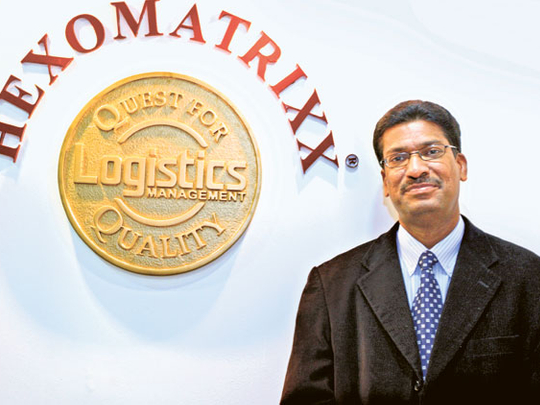
Dubai: Logistics is one industry totally reliant on networks. That applies not just to the physical network that helps in the movement of goods from one place to the other, but just as well on the less tangible one created by knowing the right people who can pass business your way.
All other things being equal, it's all to do with connecting and holding those connections close. In other words, all of which makes difficult going for a start-up since it would have to deal with an entrenched competition and the weight of their combined connections.
Not all of that matters if you time the entry well, according to Raghu Menon, managing director and chief consultant at Sharjah-based Hexomatrixx, which launched in the region in 2005.
"We started operations at a time when most logistics organisations were focusing in the freight forwarding business as bulk revenue from this category was around 63 per cent of the total industry that time," said Menon, who traded in a career in the oil industry to set up the business.
"Many of these organisations were in transition at that point and not successfully managed, the management of change beyond adding ‘logistics' to their company name. Our approach — to our targeted customers — was to be a specific supply chain provider.
"We believe supply chain challenges are unique, and this is true especially when it comes to a specific industry. Our service offered clients ‘order to cash', ‘order to deliver' and ‘purchase to pay' business models, which, I believe, were a quantum leap over the core commodity services offered by the competition.
"By industry or by geography, one's portfolio must comprise services that will be sourced by the customer on a sustainable basis to be a one-stop shop."
It obviously helped that the first contract that landed on its order book was a quite sizable $2 million (Dh7.34 million). It involved the import, storage and redistribution of base oil and Menon's background in the oil industry also came in handy.
The company's core competence revolves around the shipment of petrochemicals and petroleum products from the Middle East to Asia-Pacific and vice-versa. "As we service the downstream industry — which is a niche segment — our initial focus was Middle East and Asia-Pacific," said Menon.
"The drive to choose Middle East was to meet the local manufacturing demand and to ensure supply reliability. With its geographical location and accessibility by air, sea and road, the UAE is gaining more importance in logistics."
If the forecasts hold good, the UAE's logistics industry could soar to $10.6 billion in 2016 and growing at a near double-digit rate on the back of a marked improvement in trade volumes. It will also be helped by the creation of dedicated logistics clusters as has happened in Dubai and replicated in Abu Dhabi as well.
All of which would seed the ground for new players to come in and try for a foothold in the marketplace. But it is more than likely that they would do so by "by partnering local organisations", according to Menon.
"With the evolution third-, fourth- and fifth-party logistics (3PL, 4PL and 5PL) and with the wide acceptance of the logistics park concept, we should expect more players in the market in the coming years as upfront costs in this case are a bare minimum," he added.
"As part of the outsourcing and centralisation of activities, many organisations prefer to go with a 3PL, 4PL arrangement as this is an extension of their business to get one-stop solutions."
But wouldn't more players automatically translate into a fresh round of zero-sum games?
"We strongly believe rates alone are not a criteria in winning a contract and many global clients are aware of the poor service levels associated with low rates and the high revenue impact due to product write-offs and breakdowns in service levels," said Menon.
Not to mention detrimental to the long-term prospects of the logistics industry here.
Payment matters
In the already stretched timelines when it comes to payments, logistics providers more often that not find themselves at the back of the line. Credit periods of even 60 days and more are the norm in the current marketplace.
"Well, this will have a negative impact on organisations when it comes to injecting funds into infrastructure or go for large-scale expansion," said Raghu Menon of Hexomatrixx.
"But one thing is for sure — with every economic crisis there comes an opportunity. Some companies will go from good to great and some will just fade away making room for more innovative competitors. "To be among the winners, an organisation must consider best practices that provide both cost reductions and smart investments. We don't compromise on the TAR [trade account receivables] on both the amount and timings.
"We apply the same policy when it comes to AP [account payables] to our shareholders and service partners. We service 300 plus customers in the trading and logistics with zero bad debt."
Tips for success
- Establish high quality and sustainable service levels.
- Set realistic goals and controls.
- Be innovative and passionate.
- Always lead with smart investment.












